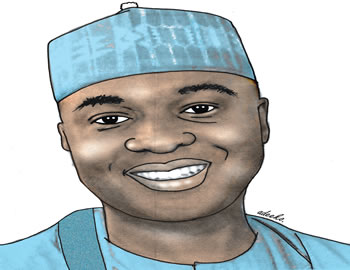ONE of the immediate responses to the current economic crisis in Nigeria was the resolution of the Eighth Senate to stand up to the challenges posed by the recession. In words and action, the Eighth Senate under the leadership of Dr Abubakar Bukola Saraki assembled to provide solutions to the cries of Nigeria over the biting economic crisis through motions and legislation.
The recession has necessitated a shortage of foreign exchange for the local manufacturers to procure needed raw materials. Amongst resultant effects has been spiraling unemployment. This is coming with the unquenchable appetites of Nigerians for foreign made goods.
In its decision to tackle this hydra-headed monster called recession, the Senate moved to amend the extant Public Procurement law by making it mandatory that preference should be giving to locally produced goods and services before attempting to purchase any foreign made goods.
Moreover, the amended procurement law made it compulsory that a certain percentage of the contract sum should be paid up front and in good time to enable local producers meet up with foreign competition. Indeed, the Senate has on June 16, 2016 passed the amended procurement law that is currently awaiting concurrence by the House of Representatives.
Aside the prioritisation of key legislation, the Senate President has granted audience to several interest groups championing the made-in-Nigeria goods project. He was visited by the Southeast Amalgamated Traders Association, the Innoson Vehicles Manufacturing Company, and the National Economic Summit Group which eventually tagged their recently concluded summit ‘Made in Nigeria.’
At all these and during such visits, Saraki made the made-in-Nigeria campaign his central message, urging Nigerians to patronise locally-produced goods in order to develop the economy. In one such visit, he was aptly quoted to have stated that ultimately the ‘Senate cannot legislate patriotism.’
To Saraki, this is the only way out of the present economic crisis. From his perspective, he believes the purchase of locally made good is tantamount to economic recovery, wherein, he stated that since the Ministries, Departments and Agencies (MDAs) are the biggest spenders, that they should be made to first patronise locally made Nigerian goods.
It was no wonder recently that the Nigerian Army bought into the made-in-Nigeria project, ordering from the Aba leather industry the production of 50,000 pairs of combat booths for Nigerian soldiers. It was this that prompted the executives of Leather and Allied Products Manufacturers Association of Abia State (LEAPMAAS) to visit Abuja to thank the Senate President for his tireless efforts in championing the movement. The spokesman of LEAPMAAS, Chief Ben Hart, commended Saraki and the Senator representing Abia South, Enyinnaya Abaribe for their support in propagating Aba goods.
In response, Dr Saraki congratulated the Aba traders for the recognition now being given nationally to their efforts and their products. He said: “I commended you about what you are doing. I promised you when I came to the trade fair you organised in Abuja and said that with the support of my colleagues in the Senate, we will take the campaign beyond that of a thing restricted to only trade fairs. I promised that we will make it the agenda of all Nigerians. Today, we have made it a national project. I commend you that over the years you have been there, giving your support for the government and proving that you have the capacity to do it. We told you that time that we are going to pass a law to support your efforts and make it compulsory for government agencies to patronise your products before resorting to foreign goods. On June 16, 2016, we passed the amended Public Procurement Act.
“I have a promise from the House of Representatives that they will soon pass theirs. Government must ensure that they must patronise locally made goods. It has started with the Army. If the Army is doing that, I also challenge all the other agencies whether it is Air force, whether it is Navy, Customs, even the Road Safety, Civil Defence to procure their booths and other items from Nigerian manufacturers. I also challenge all Senate committee chairmen to impress it on all agencies they supervise during their budget defence that they must compulsorily patronise local goods.
“If there is any agency that is making it difficult for you to sell your goods or deliberately bypassing local goods to purchase foreign goods, let us know. We will take up the case. We will ensure MDAs comply with the procurement law. This is the only way to save our economy. They must give evidence that they patronise and purchase locally made goods. Our plan is to ensure that a huge chunk of the N2 trillion that government spends every year on procurement should go into the pockets of Nigerians and help to create employment and improve our Gross Domestic Products. We know that government spends close to N2trn in good and services, even if you look at the budget if all these agencies, it is enough for you to increase your production and that will make Nigeria to take over some of the West African region.
- Okocha is Special Assistant to the Senate President on Print Media.






